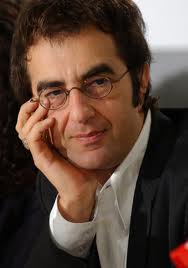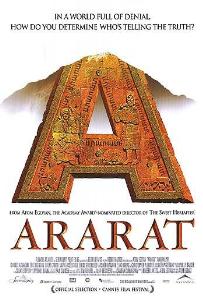Ararat (film): Difference between revisions
m (moved Ararat (Turkish film) to Ararat (film)) |
No edit summary |
||
| (2 intermediate revisions by the same user not shown) | |||
| Line 1: | Line 1: | ||
====Date: [[:Category: | ====Date: [[:Category:2003|2003]] [[:Category:2004|2004]]==== | ||
====Region: [[:Category:Europe|Europe]] [[:Category:Middle East|Middle East]]==== | |||
====Subject: [[:Category:Political/Economic/Social Opinion|Political/Economic/Social Opinion]]==== | |||
====Medium: [[:Category:Film Video|Film Video]]==== | |||
====Medium: [[:Category:Film Video|Film Video | |||
---- | ---- | ||
[[File:Ararat2.jpg|left]] | |||
'''Artist:''' Atom Egoyan (b. 1960) | |||
'''Confronting Bodies:''' Italian Government; Turkish National Action Party, and other Turkish nationalists. | |||
'''Confronting Bodies:''' Turkish National Action Party, and other Turkish nationalists. | |||
'''Dates of Action:''' 2003, 2004 | |||
'''Location:''' Italy; Istanbul, Turkey | |||
[[File:Ararat1.jpg|right]] | |||
'''Description of Artwork:''' The film, ''Ararat'', depicts a massacre that took place in 1915, when Turkish nationalists violently drove Armenians from the Anatolia region of Turkey. The events of these massacres have been a taboo subject in Turkish discourse. <P> | |||
''' | '''The Incident:''' ''Ararat's'' scheduled 2003 release in Italy was delayed, according to Government authorities, for incomplete paperwork filing to the censorship board. It's scheduled premier in Turkish theaters was indefinitely postponed as it is feared that the dramatic telling of these events will provoke hostility among Turkish nationalists who do not want to acknowledge Turkish crimes against humanity. The National Action Party has declared that they would take violent action against any theater that shows the film. <P> | ||
'''Results of Incident:''' The film's Turkish distributor has postponed the screening of the film in response to the threat of violence. Turkey's Minister of Culture and Tourism has exalted the government's approval of the film as a great step toward democracy and free speech in the country, but fears it will precipitate nationalist hostility. <P> | |||
'''Source:''' The New York Times; http://www.anca.org/ancadesk.php?adid=189 | |||
[[Category:2003]] | |||
[[Category:2004]] | |||
[[Category:2000s]] | |||
[[Category: | [[Category:20th century]] | ||
[[Category:]] | [[Category:Europe]] | ||
[[Category: | [[Category:Middle East]] | ||
[[Category:Political/Economic/Social Opinion]] | [[Category:Political/Economic/Social Opinion]] | ||
[[Category:Film Video]] | [[Category:Film Video]] | ||
[[Category:Atom Egoyan]] | [[Category:Atom Egoyan]] | ||
{{DISPLAYTITLE:<span style="font-style: italic;">Ararat</span> (film)}} | |||
__NOTOC__ | __NOTOC__ | ||
Latest revision as of 21:04, 19 January 2012
Date: 2003 2004
Region: Europe Middle East
Subject: Political/Economic/Social Opinion
Medium: Film Video
Artist: Atom Egoyan (b. 1960)
Confronting Bodies: Italian Government; Turkish National Action Party, and other Turkish nationalists.
Dates of Action: 2003, 2004
Location: Italy; Istanbul, Turkey
Description of Artwork: The film, Ararat, depicts a massacre that took place in 1915, when Turkish nationalists violently drove Armenians from the Anatolia region of Turkey. The events of these massacres have been a taboo subject in Turkish discourse.
The Incident: Ararat's scheduled 2003 release in Italy was delayed, according to Government authorities, for incomplete paperwork filing to the censorship board. It's scheduled premier in Turkish theaters was indefinitely postponed as it is feared that the dramatic telling of these events will provoke hostility among Turkish nationalists who do not want to acknowledge Turkish crimes against humanity. The National Action Party has declared that they would take violent action against any theater that shows the film.
Results of Incident: The film's Turkish distributor has postponed the screening of the film in response to the threat of violence. Turkey's Minister of Culture and Tourism has exalted the government's approval of the film as a great step toward democracy and free speech in the country, but fears it will precipitate nationalist hostility.
Source: The New York Times; http://www.anca.org/ancadesk.php?adid=189

